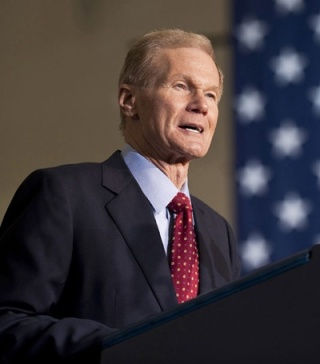Senator Bill Nelson
(BLACK PR WIRE) When I read Dust Tracks on a Road: An Autobiography, by noted Florida author Zora Neale Hurston, I imagined a group of children laughing and leaping, hands outstretched toward the sun.
“Mama exhorted her children at every opportunity to jump at the sun,” Hurston wrote. “We might not land on the sun, but at least we would get off the ground.”
For such an image, a picture of hope and striving, I am thankful.
I’m thankful, too, that this famous writer from the first-half of the last century made tiny-little Eatonville, Florida, her beloved home.
In fact, when Barack Obama was still just a junior senator, I took him there for a visit.
It’s been said recently that Zora Neale Hurston helped shape America’s racial heritage, that through her own wit and wisdom she educated America’s citizens about the richness of our diversity.
“Sometimes,” she once said, “I feel discriminated against, but it does not make me angry. It merely astonishes me.
“How can any deny themselves the pleasure of my company?”
Indeed, we cannot celebrate Black History Month without her – and without also acknowledging the contributions of so many other African-American Floridians.
Some of these men and women were artists, educators, sculptors, writers, actors, musicians. Others were scientists and inventors. One gave us Lilies of the Field. Another, Famous Amos chocolate-chip cookies. Yes, Sidney Poitier was born in Miami; and, yes, Wally Amos is from Tallahassee, Florida.
Thank you, both, for your sweet contributions to our cultural heritage.
And thank you Mary McLeod Bethune, who founded one of our oldest and most prestigious black colleges, Bethune-Cookman, in Daytona Beach.
Thank you also to Judge Joseph Woodrow Hatchett, who became the first African American elected to Florida’s Supreme Court.
And thank you James Weldon Johnson, who was a Jacksonville-born author and lyricist before becoming the first African-American executive director of the NAACP.
Thank you to Timothy Thomas Fortune, who was born and raised in Marianna, Florida, before going on to become editor and publisher of a newspaper called the New York Age, a platform for defending the civil rights of African Americans.
And thank you Asa Philip Randolph, who was born in Crescent City, Florida, and went on to found the Brotherhood of Sleeping Car Porters, the first union by and for African Americans.
Thank you to Augusta Christine Savage, who was born in Green Cove Springs, Florida, and who later became the first director of the Harlem Community Arts Center.
And thank you General Daniel “Chappie” James Jr., of Pensacola, Florida, the first African-American four-star general who was one of the Tuskegee airmen.
Thank you John Henry Lloyd, who was born in Palatka, Florida, and was a baseball player and manager in the Negro Leagues, and also was considered one of the greatest shortstops in the game.
Besides Lloyd, more than a dozen former Negro League baseball players call Florida home. No doubt the fans still appreciate all their contributions to America’s favorite pastime.
And no doubt our state has been enriched by the Florida Highwaymen, a group of African-American landscape painters who, like Hurston, are in the Florida Artists Hall of Fame.
Clearly the fabric of Florida’s history has been woven in part by many African Americans. But remembering these men and women - past, present and future - shouldn’t be unique to February. We should remember and honor them every day.
As we do this, we may not be reaching the sun, but we will be getting off the ground.
The writer is Florida’s senior U.S. senator and a fifth-generation Floridian.

